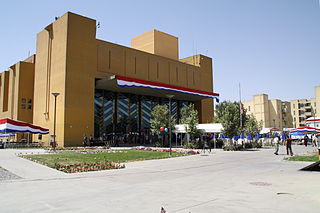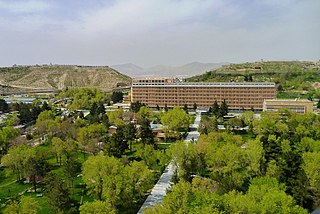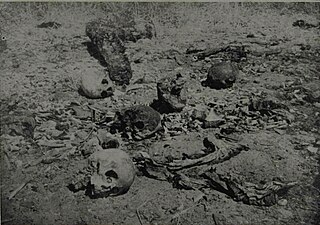
The Taliban insurgency began after the group's fall from power during the 2001 War in Afghanistan. The Taliban forces fought against the Afghan government, led by President Hamid Karzai, and later by President Ashraf Ghani, and against a US-led coalition of forces that has included all members of NATO; the 2021 Taliban offensive resulted in the collapse of the government of Ashraf Ghani. The private sector in Pakistan extends financial aid to the Taliban, contributing to their financial sustenance.

The Haqqani network is an Afghan Islamist group, built around the family of the same name, that has used asymmetric warfare in Afghanistan to fight against Soviet forces in the 1980s, and US-led NATO forces and the Islamic Republic of Afghanistan government in the 21st century. It is recognized as a terrorist organization by the United Nations. It is considered to be a "semi-autonomous" offshoot of the Taliban. It has been most active in eastern Afghanistan and across the border in north-west Pakistan.
Hafiz Gul Bahadur is the leader of a Pakistani Taliban faction known as the Gul Bahadur Network (HGB) based in North Waziristan and surrounding districts of the former FATA region in northwestern Pakistan. Upon the formation of the Tehrik-i-Taliban Pakistan (TTP) in December 2007, he was announced as the militant group's overall naib amir under Baitullah Mehsud, who was based in South Waziristan, but has largely distanced himself from the TTP due to rivalries with Mehsud and disagreements about the TTP's attacks against the Pakistani state. Following the Fall of Kabul (2021), the Gul Bahadur Network’s ties to the Haqqani Network and TTP have significantly improved, resulting in a sharp increase in cross border militant incursions along the Pakistan-Afghanistan international border.
The February 2010 Kabul attack on 26 February 2010 was a combined suicide bombing and shooting attack. A car bomb levelled the Arya Guesthouse, also known as the Hamid Guesthouse, popular with Indian doctors. Two armed attackers then entered the nearby Park Residence, housing other foreigners. One detonated a suicide bomb, and the other was shot dead. The Safi Landmark Hotel nearby was badly damaged by the blasts. At least 18 people were killed and 36 more were injured.
Events from the year 2011 in Afghanistan.

The April 2012 Afghanistan attacks took place on Sunday, 15 April 2012, at around 13:00 local time when heavily armed Taliban insurgents and suicide bombers launched multiple coordinated attacks throughout Afghanistan. Insurgents launched the 2012 spring offensive on multiple locations, including government buildings, military bases, and embassies. Attacks occurred in four Afghan provinces, including Kabul and Paktia. Different reports attribute responsibility for the attacks to either Taliban or the Haqqani network although the Taliban have claimed responsibility.
The following lists events that happened during 2015 in Afghanistan.
The following lists events that happened during 2016 in Afghanistan.

On 28 June 2011, a group of nine gunmen and suicide bombers attacked the Inter-Continental Hotel, Kabul. The attack and an ensuing five-hour siege left at least 21 people dead, including all nine attackers. Responsibility was claimed by the Taliban.
Events in the year 2017 in Afghanistan.

The Sardar Mohammad Daoud Khan National Military Hospital, often referred to as the Daoud Khan Hospital or the National Military Hospital, is a military hospital located in Kabul, Afghanistan. With 400 beds, it is one of the largest military medical facilities in Afghanistan, and prior to 2021 provided medical services to members of the Afghan National Security Forces, and also contains a teaching department. Constructed in 1973 by engineers from the then-Soviet Union, it is now described as the "crown jewel" of the Afghan healthcare industry.
On 31 May 2017, a truck bomb exploded in a crowded intersection in Kabul, Afghanistan, near the German embassy at about 08:25 local time during rush hour, killing over 150 and injuring 413, mostly civilians, and damaging several buildings in the embassy. The attack was the deadliest terror attack to take place in Kabul. The diplomatic quarter—in which the attack took place—is one of the most heavily fortified areas in the city, with three-meter-high (10 ft) blast walls, and access requires passing through several checkpoints. The explosion created a crater about 4.5 meters (15 ft) wide and 30 feet deep. Afghanistan's intelligence agency NDS claimed that the blast was planned by the Haqqani Network. Although no group has claimed responsibility, the Afghan Taliban are also a suspect but they have denied involvement and condemned the attack. It was the single largest attack on the city up till that point.
Events in the year 2018 in Afghanistan.

The Islamic State–Taliban conflict is an ongoing insurgency by the Islamic State Khorasan Province (IS-KP) against the Taliban regime in Afghanistan. The conflict initially began when both operated as rival insurgent groups in Nangarhar; since the formation of the Taliban's state in 2021, IS-KP members have enacted a campaign of terrorism targeting both civilians and assassinating Taliban members using hit-and-run tactics. The group have also caused incidents and attacks across the border in Pakistan.
On 1 July 2019, a combined gun and bomb attack took place in the Wazir Akbar Khan neighborhood of Kabul, Afghanistan. The attackers initially detonated a bomb-laden truck, after which five gunmen entered a nearby building under construction and fired on Afghan security personnel evacuating people onto the street. At least forty-five were killed, including the five attackers. The spokesman for the Afghan Ministry of Public Health, Wahidullah Mayar, said that 116 civilians, including 26 children and 5 women, were wounded. The Taliban claimed the responsibility for the bomb attack in Kabul and said although civilians were not the Taliban target, some were injured.
Events in the year 2020 in Afghanistan.

On 25 March 2020, ISIS gunmen and suicide bombers attacked the Gurdwara Har Rai Sahib in Kabul, Afghanistan.
In May 2020, a series of insurgent attacks took place in Afghanistan, starting when the Taliban killed 20 Afghan soldiers and wounded 29 others in Zari, Balkh and Grishk, Helmand on 1 and 3 May, respectively. On 12 May, a hospital's maternity ward in Kabul and a funeral in Kuz Kunar (Khewa), Nangarhar were attacked, resulting in the deaths of 56 people and injuries of 148 others, including newborn babies, mothers, nurses, and mourners. ISIL–KP claimed responsibility for the funeral bombing, but no insurgent group claimed responsibility for the hospital shooting.







